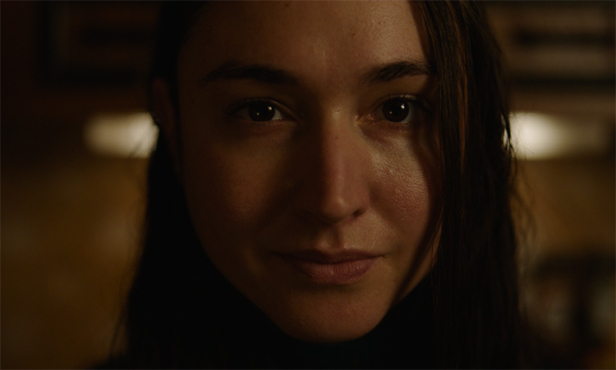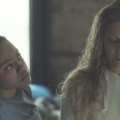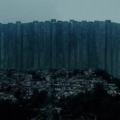You’ll Never Find Me opens with two disparate scenes. In the first, we see a woman, distorted and almost a silhouette, standing and soaking outside in a deluge of rain, just as she starts to lean in towards the window of a car from whose interior the scene is being shot. And in the second, as Betsy Brye’s Sleep Walk (1959) plays on a trailer’s radio at night, a middle-aged, bearded man sits, his back to the camera, with a mug on the table before him, and a small phial of clear liquid in the palm of his hand. The diptych formed by these two disparate scenes, the film’s alpha and omega, is rooted in the polarities of day and night, exterior and interior, woman and man – but the one element that merges them is a persistent, torrential downpour, washing from one scene to the next and permeating the soundtrack.
Whatever it is that that man (Brendan Rock) was going to do with that small bottle in his palm, he is interrupted, on this archetypal ‘dark and stormy night’, by a loud knocking at his caravan’s door – and as he reluctantly offers shelter from the rain to this young, soaking visitor (Jordan Cowan), and she just as reluctantly enters this older stranger’s home, situated at the shadowy end of a remote trailer park where people come to lose themselves, an awkward impasse settles between them. It is too tempestuous for her to venture out again to the payphone at the park’s entrance to call a car, and in any case, the front gate is locked at night – and so she stays, furtively taking in her new, constricted surroundings and ever so gradually warming to this courteous, softly spoken hermit.
“Our brains read joy and danger as the same thing,” the man will tell the visitor, “like a population of fucking moths.” He might as well be describing the sort of conflicting emotions that You’ll Never Find Me inspires in the viewer, thrilled by the immense tension which filmmakers writer Indiana Bell and her co-director Josiah Allen draw from every nuanced detail of these two characters’ exchanges. As the mysteries compound (what was the man doing before? How and why did the woman find her way to this sequestered trailer so late in the night? What has she fled? And why does she keep having disturbing visions of blood?), the dread palpably builds – although of what, exactly, remains elusive, at least until the third act – and there is a peculiar pleasure to be had in all the panic of all this unfolding paranoia.
You’ll Never Find Me is, for the most part, a two-hander, confining itself to an Aristotelian unity of time and place (a single trailer home in the wee hours), and further tightening the intensity of its spare scenario by gradually reducing the lighting and favouring tight close-ups. It is both a tour de force of minimalist filmmaking, and a class act, as Rock and Cowan barely ever raise their voices and give little away beyond their shared, infectious vibe of mutual suspicion, fear and mistrust. It is not until halfway through the film that we even learn the man’s name – and the visitor does not reciprocate with her own – yet much as when, to pass the time, these two play a game of Bullshit together with a deck of cards, they both have, beneath their poker faces, a number of tells. For here even the most casual-seeming of single lines or longer stories swapped between them is both concealing and slyly revealing a truth that weighs heavily in this claustrophobic milieu.
While the man is sure he recognises his visitor from somewhere, she seems less sure, and remains guarded and wary. “I’m just trying to work out what is actually happening here,” the woman will say amid all the unfolding mystery – and later, the man will ask: “What are you doing here? What are you actually doing here tonight, can you tell me that,” to which the woman will reply, “I just want the fucking key!” She means the key to the trailer’s door, but her words are as much metaphorical as literal – and once that key has been furnished (in fact it is always being furnished) by a meaningful convergence of echoing signifiers, a harrowing yet strangely satisfying turn of events is staged in this space of dark interiors and deep trauma. For as the cards are finally laid out on the table, every narrative choice, every feint and bluff, will find its place in the emerging psychodrama (complete with Hitchcockian shower scene).
Bell and Allen have been carefully honing their skills on a number of shorter collaborations, and this debut feature – an unsettling dialectic between male and female energies – comes too finely crafted to be reduced to the status of mere ‘calling card’, heralding the arrival of two extraordinary talents who are not just at the door, but have already turned your cosy headspace inside out and demanded your full, close attention. Together they stage the meeting of two lost souls, both lonely, both damaged, both haunted by a tragically shared fate. Even if it is the man who does most of the talking, the ‘little voice’ of his not altogether welcome guest must also be heard over all the other din – the radio, the wind, the rain, the creaking and knocking – that noisily assails the mind. Eventually the title, already a hermeneutic challenge, will assume ironies as layered as the caravan’s clutter, in a slow and twisty tale of humanity missing and conscience never completely buried.
You’ll Never Find Me had its world première at Tribeca Film Festival. Read more reviews at SciFiNow.




